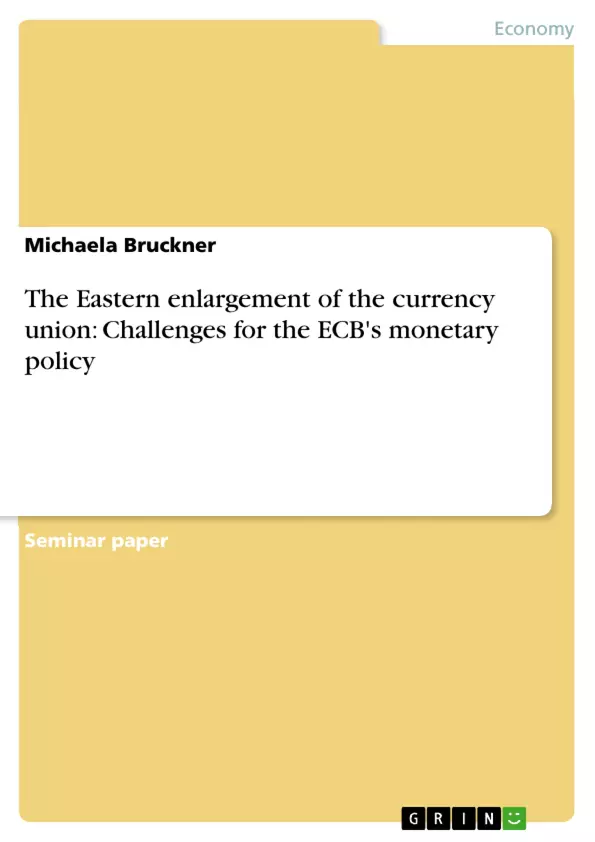The eurozone member countries have agreed to permanently abandon economic policy instruments such as monetary and exchange rate policies and to accept the European Central Bank (ECB) as the decision making body to determine the common monetary policy, notably the interest rates and the money supply. It goes without saying that such an institution is not able to fine-tune its decisions in order to meet particular economic challenges in certain member countries. In this respect, the eastward enlargement of the European Monetary Union (EMU) will bring major challenges to the ECB, as varying inflation rates in different member countries and the determination of a single interest rate may have disruptive consequences.
From the viewpoint of the eastward enlargement of the eurozone the paper illustrates the various challenges the ECB inevitably has to face. Further, it describes the reform of the ECB Governing Council. An important question concerning the ECB is the following: Is there a danger for the single European monetary policy from letting Central and Eastern European Countries (CEEC) join the eurozone or from letting them join the eurozone too early?
Inhaltsverzeichnis (Table of Contents)
- INTRODUCTION.
- THE MONETARY POLICY STRATEGY OF THE EUROPEAN CENTRAL BANK .....
- CHALLENGES IN THE DECISION-MAKING PROCESS.
- THE GOVERNING COUNCIL OF THE ECB AS THE MAIN DECISION-MAKING BODY.
- THE THREE-GROUP ROTATION SYSTEM....
- EVALUATION OF THE ROTATION SYSTEM...
- THE CHALLENGE OF HETEROGENOUS MEMBERSHIP.
- INFLATION DIFFERENTIALS.
- ASYMMETRIC SHOCKS
- DIFFERENT BUSINESS CYCLES
- BALASSA-SAMUELSON-EFFECT
- POLICY CHALLENGE IN COMPLETING TRANSITION
- CONCLUSION AND POINTS OF CRITICISM.
Zielsetzung und Themenschwerpunkte (Objectives and Key Themes)
This seminar paper explores the challenges posed to the European Central Bank (ECB) by the eastward enlargement of the eurozone. It investigates potential disruptions caused by varying inflation rates across member countries and the implications of setting a single interest rate for diverse economies. The paper analyzes the ECB's decision-making process, particularly the Governing Council's structure and the challenges presented by the heterogeneity of member countries.
- The impact of eastward enlargement on the ECB's monetary policy strategy
- The challenges of coordinating monetary policy across diverse economies
- The effectiveness of the ECB's decision-making structure in the context of enlargement
- The implications of heterogeneous inflation rates, business cycles, and economic shocks
- The potential impact of Eastern European countries joining the eurozone
Zusammenfassung der Kapitel (Chapter Summaries)
The paper begins by outlining the monetary policy strategy of the ECB, highlighting its key objectives and tools. The subsequent section delves into the institutional challenges of decision-making within the ECB, focusing on the structure of the Governing Council and the three-group rotation system. This analysis examines the effectiveness of this system in light of the expanding membership of the eurozone. The third section explores the challenges arising from the heterogeneity of member countries, specifically addressing issues related to inflation differentials, asymmetric shocks, different business cycles, and the Balassa-Samuelson effect.
Schlüsselwörter (Keywords)
Key terms and concepts central to this paper include: Eastern enlargement, eurozone, European Central Bank (ECB), monetary policy, inflation, business cycles, asymmetric shocks, heterogeneity, decision-making, Governing Council, rotation system, Balassa-Samuelson effect, transition economies.
Frequently Asked Questions
What are the main challenges of the ECB's eastward enlargement?
The main challenges include dealing with varying inflation rates across member countries and the difficulty of setting a single interest rate for highly diverse economies.
What is the "rotation system" in the ECB Governing Council?
It is a reform that divides member countries into groups that rotate their voting rights, ensuring the Governing Council remains efficient as the number of eurozone members increases.
How do asymmetric shocks affect the currency union?
Asymmetric shocks occur when an economic event affects member countries differently. Since they share a single monetary policy, the ECB cannot "fine-tune" interest rates for just one struggling country.
What is the Balassa-Samuelson effect?
It explains why transition economies often experience higher inflation rates due to productivity growth in the tradable sector, which can complicate the ECB's goal of price stability.
Is there a risk in Central and Eastern European Countries (CEEC) joining too early?
Yes, the paper discusses whether premature entry could lead to economic disruptions if the CEEC business cycles and inflation rates are not sufficiently converged with the rest of the eurozone.
- Quote paper
- Michaela Bruckner (Author), 2007, The Eastern enlargement of the currency union: Challenges for the ECB's monetary policy , Munich, GRIN Verlag, https://www.grin.com/document/77999



